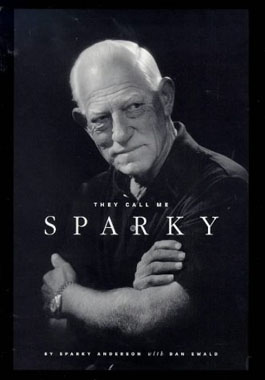If there's such a thing as someone feeling lonely when tens of thousands of people are screaming on your every move, then I suppose it would have to be a pitcher working on a no-hitter.
Even when the TV announcers refuse to acknowledge the feat, as FSN's Mario Impemba and Rod Allen did last night, describing Justin Verlander's no-no at CoPa. Not once did the words "no-hitter" escape either man's lips. Instead, they let the crowd -- and strategically placed shots of the ballpark scoreboard -- tell the story.
 Filthy. Nasty. And ridiculous.
Filthy. Nasty. And ridiculous.
Not so 23 years ago, when Jack Morris hurled the last Tigers no-hitter in the season's first weekend, at Chicago's old Comiskey Park.
It was the NBC "Game of the Week," -- that Saturday afternoon staple. Vin Scully was behind the mike, and he continually broke baseball's axiom of not mentioning a no-hitter while it's in progress. From about the fifth inning on, Scully wasn't shy to say "no-hitter" in waxing descriptive about Morris's performance. It was so incessant that when the final out was recorded -- a strikeout of Ron Kittle -- and Scully yelled, "And he HAS his no-hitter!," I thought, "No, Vin -- he has YOUR no-hitter!"
Morris defied Scully's rules-breaking and the yammering of a loudmouth White Sox fan, who kept trying to jinx Morris by mentioning his gem-in-progress every time the pitcher returned to the dugout. After the no-no was in the books, Morris spotted the fan and said, "I got it, you #$!#!"
True to the rules, third baseman Brandon Inge said that "not a word was spoken (about the no-hitter) all night." Verlander concurred, saying that nobody sat next to him in the dugout.
My favorite rules-breaking story involves Don Larsen and his perfect game in the 1956 World Series. In a documentary I saw on television, Larsen's voice provided the narrative as highlights from the game flickered in black-and-white on my set.
"Nobody would look at me. Nobody would talk to me," Larsen says as we see him strike out guys and mow the Dodgers down. "I felt like the loneliest man on earth.
"Finally, around the seventh inning I went up to (Mickey) Mantle and said, 'Wouldn't it be something if I threw a no-hitter in the World Series?' He just looked at me like I was insane and moved away from me."
I think it's a riot that Larsen himself broke the rules, at his own risk.
Verlander, probably, could have endured various attempts at jinxing last night. He had "great stuff", those all-encompassing words for when a pitcher can do little wrong. He was "filthy," "nasty," and "ridiculous" -- if you listened to or read what the Brewers' hitters had to say after he handcuffed them and threw away the key.
In retrospect, I, perhaps, was a rules-breaker myself last night.
I wasn't watching the game -- not at first. I had ceded the TV to my wife, and was sitting with her in the front room when my cell phone caught my eye. Too lazy to walk into the computer room and check the score on the Net, I opened my phone's web browser and went to MLB scores. Tigers 3, Milwaukee 0, 7th inning. I highlighted the game and pressed SELECT. There was the line score, in tiny but powerful type: MIL 0 0 0. One out in the seventh inning.
"Justin Verlander has a no-hitter in the seventh!," I said.
"Wow," my wife said -- and kept watching her program.
I followed the game via cell phone until I could take it no longer. But I had a choice to make: Verlander hadn't needed my help for seven innings. Would I screw him up by tuning in for the eighth and ninth?
Damn the baseball rules -- I wanted to see history!
I sweet-talked my way into taking over the TV. And so I saw the last two innings of Verlander's brilliance -- including the amazing play made by Neifi Perez to both steal a hit and start a double play in the eighth.
I was standing throughout the ninth -- which thankfully didn't take all that long. Verlander did indeed have "nasty stuff" -- stuff that easily overwhelmed any bad karma my late arrival might have wrought.
We can say it now with impunity: Justin Verlander has a no-hitter going!
No-hitter now complete. Done. In the books.
That's the best thing about pitching a no-hitter, I would think: when it's over with, the void of loneliness is filled over with love and support from your fans and teammates in a bursting through that certainly can't be topped by much else.
It's another thing that only the athlete himself can truly understand. We can only imagine.















 Proud Member of DIBS
Proud Member of DIBS
